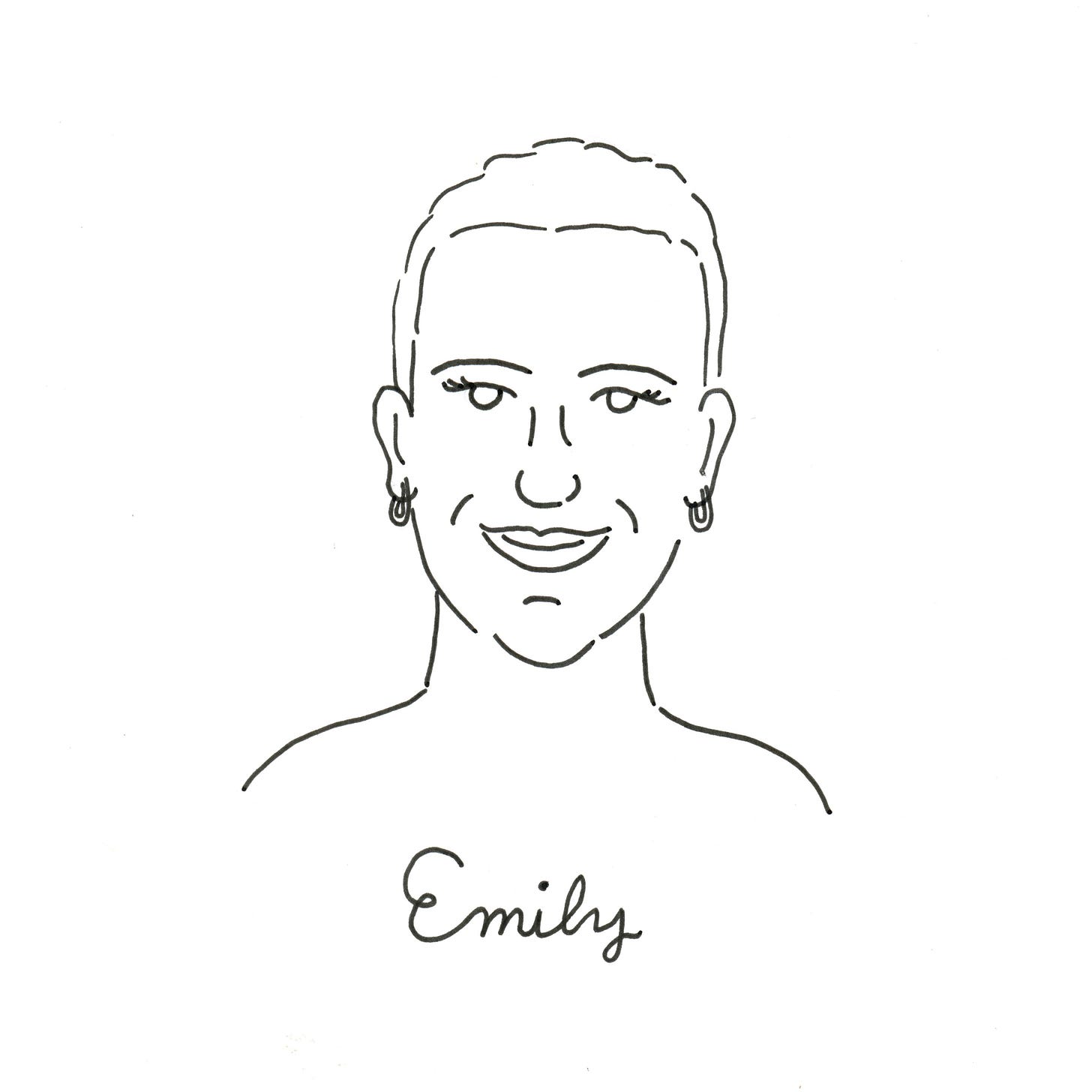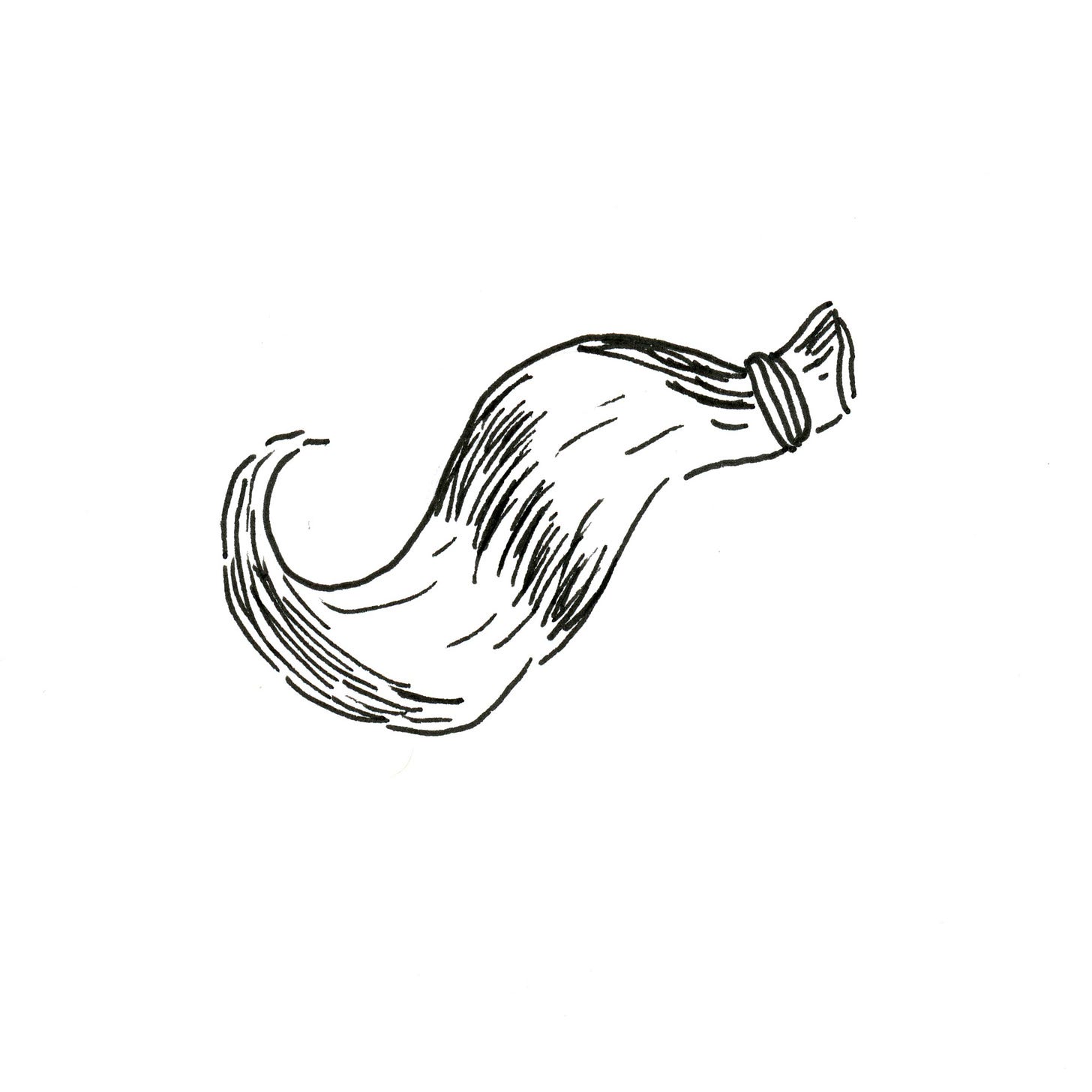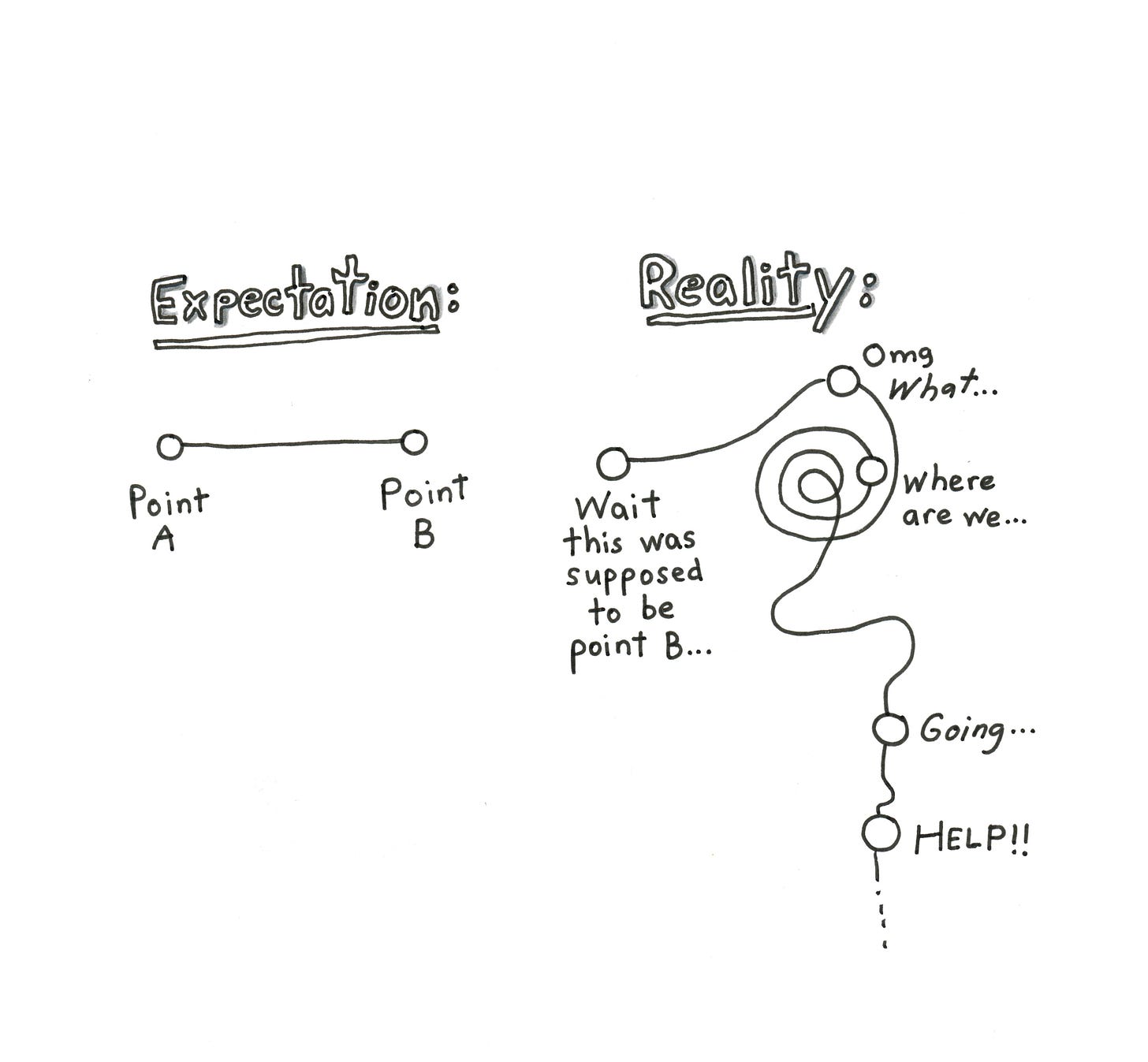This is a new series from olive it called “Her Turn.”
Personally, one of the most rewarding parts of making art is documenting people’s stories. I firmly believe that the only textbook one really needs in life is an openness to the perspectives of those around us. So in these essays, I’ll be passing the mic to women who have something to say. I’ll still be around, drawing in between.
***
My cousin Emily is a Special Ed teacher in Marin County. In November of 2022, a couple of months after her 34th birthday, she found a lump in her breast.
This is her account of a year of cancer treatment, survivorship, and the huge shifts— in mind, body, and spirit— one undergoes when they receive a life-changing diagnosis.
Emily’s been a fighter from the beginning. She was born extremely premature, weighing under two pounds and spending over one hundred days in the NICU. That was a journey she couldn’t remember, but this one is crystal clear. I asked her to tell me what it’s been like, and here’s what she said:
“I found the lump myself, in my left breast.
Leading up to it, of course you go to Google and the first thing that comes up is breast cancer. I thought: That’s just my mind going wild. It can’t be. You hear people feeling slight lumps in their breasts all the time. It’s probably nothing. But I made an appointment anyway. Everyone in my life said: “It’s fine. It’s fine. It’s fine.”
It was behind my nipple. The nipple was more inverted, and what had happened was the tumor was sucking it in. To be honest, a couple months prior I felt something but thought: Oh, it’s nothing.
I made the appointment, but they canceled it because the doctor was sick, so I rescheduled. I remember I went on a trip that weekend with my best friend, Sarah, and I asked if she wanted to feel the lump, you know, to see what she thought. I’ll never forget her face. She was like “yeah…that feels different…” We both just kind of looked at each other. On that trip, in the back of my head all I could think about was: What if I have cancer? What if I have cancer?
It’s kind of all a blur. Once they tell you the news you kind of black out. It’s very numbing, like, this can’t be happening. Then it switched to: Ok, what do I need to do to get through this and find resources? The whole time I was researching, researching, researching.
I’m such a planner. So letting go was really hard. Any time I thought: This is going to feel like this, or I’m going to do this on this date, it didn’t happen that way. I was researching, not so much my diagnosis, because I knew that would send me into a spiral, but things that could support me throughout the journey. I was always trying to plan in that sense. Planning what was going to support me through everything; acupuncture, support groups, finding a gym, making a wishlist of everything I needed for recovery from surgery. All to feel like I had some kind of control.
There were three moments throughout my cancer journey that were the hardest, mentally. The first was before, leading up to the diagnosis; that was agonizing and so difficult.
The second was the fertility journey. The fertility process —injecting your body with hormones— each injection is so stressful. You have to make sure you have enough follicles. And you’re just thrown into it. Doing the egg retrieval and not having enough eggs to freeze —or any eggs for that matter— was really difficult. But I didn’t have a lot of time to process it, because chemo was starting. My egg retrieval was March 8th and chemotherapy started March 14th. So I had a day of crying in bed about it. I felt it, for sure, but there was no lingering.
The third most difficult part of the journey was losing my hair. I had heard about cold-capping, where they wrap your head with these freezing packs so they can preserve your hair. Once I researched it a bit more and saw what it entailed I decided no. I think you have to wear it an hour before the infusion, throughout the infusion, and an hour after. It’s an added expense, not covered by insurance, and you may still lose your hair.
I grieved losing my hair a lot leading up to it. And it happened quickly, after my first round [of chemo]. I remember them telling me it would likely be after my second round, so that’s what I had in my mind. After the second round, I imagined, my family and my boyfriend and everyone will get together and we’ll shave my head. But it happened seventeen days after my first round.
You know when you run your hands through your hair? It would start coming out in clumps. So I decided to go to Great Clips to get it cut short, and that would be the first phase. I thought I’d shave it when I was ready.
I went into Great Clips, and luckily it was just me and this hairstylist. I told her what was going on. She washed my hair and then, when she started to brush it, it matted. She couldn’t even brush through it. I looked down and the floor was covered with my hair.
My mom was next door getting groceries and I was trying to call her to tell her to come over because I needed to decide immediately if I was going to shave it or not. And the woman felt so bad. She said, “Whatever you want to do, I’ll do it.” So I said, “Just shave it.” It was too much to think of having to go home and wash my hair again and do it myself.
I was sobbing throughout the whole process. Because I was NOT ready. It was not how I envisioned it. Even now, I feel like I’m just getting comfortable going out in public with a shaved head. It’s hot, so I’m over wearing wigs. But it’s still hard. People look at you differently. I think it will get to a point where it will feel more empowering, but it’s just where I am.
I just finished radiation. I think that people who work as radiation techs and nurses must go through some sort of special training. They’re unbelievably kind.
A fun detail is that they blast a song during each treatment. And it was fun, because every day they played a different song; “The Way You Make Me Feel” by Michael Jackson, “Dreams” by Fleetwood Mac. It was a nice way to get your mind off of what was happening.
On my last day, I was waiting for the song, and it was completely silent. I started crying. I was thinking about the fact that it was done, that I didn’t have to come to these appointments anymore, that it was kind of anti-climactic. Even ringing the bell, which is a tradition when you finish treatment, was kind of anti-climactic. I thought all the nurses would come out, but they had work to do. It was just me and Trevor (my boyfriend), who was videotaping me. So funny.
I would have moments in radiation. I’d meet people in the waiting room and think: This is wild. Everyone is here because they have cancer. Some days I would appreciate the community and the kindness. Other days I’d be angry about it. Everyone is here because we have cancer.
My Breast Care Coordinator, Joanna, mentioned something in the last Support Group we had called “The Big Surrender” or “The Great Surrender.” Where you have this moment where you let go and surrender to your situation. And I guess it’s happened for me, but I’m still waiting for the relief piece. There’s still a lot of sadness there, you know? A lot of grieving what my life was like before.
I just feel so different. I think there’s this anxiety around going back to “normal,” when I feel like such a different person. And just trying to navigate survivorship when so much has happened. Like, part of you wants your old life back, but you’re not the same. It’s trying to navigate that, and also honor all that I’ve been through. And give myself a lot of grace and rest. I try to remember that there will be joy again. It’s just hard to find sometimes.
My best day in the last seven months was when Sarah and I went to a pop-up show of our favorite band, boygenuis. Because I’m home all day, I had time to hop on and get tickets. They were hard to get; it was only a 200 person venue. When we got there [boygenius] said, “we really envisioned everyone sitting,” so we all sat down. It was so intimate. It felt like someone’s house. That was the day, or the moment, when I thought to myself: There will be joy again. We were sitting on the ground, crying, listening to them. It was the best.
When we drove home, we were talking about the setlist. At one point we realized how nice it was to not be talking about cancer.
Sarah and I are getting matching tattoos of pink carnations. It came from the song “We’re in Love.” At the show, some really die-hard fans were passing out these little cards with flowers on them that on the back said “hold this up during the lyrics: I’ll be the boy with the pink carnation.” We thought maybe someone was proposing. But no, it was just a fan creating a special moment. Lucy Dacus started crying when everyone held them up. Then the fan handed her a bouquet.
Me being a researcher, I’ve looked into pink carnations more. I like to think about dual meanings. Pink is the color for breast cancer, obviously. And the carnation itself means gratitude. It’s fitting.
One thing I hear a lot of people say that their support has changed or people haven’t shown up for them in the way they would’ve hoped. And that’s not been the case for me. I’m so, so grateful for all the support I’ve gotten with my friends and family and my boyfriend. People have shown up so steadily.
So much has changed, but that hasn’t changed… the people who have been in my life before are still here.
I think they’ll always be.”
- Emily de Recat
October is breast cancer awareness month, which aims to promote screening and prevention of the disease, which affects over 2.3 million people worldwide. Breast self-exams, an annual exam by your doctor, and yearly mammograms are important tools in breast cancer detection — especially early detection, when cancers may be more treatable.
This information is provided by Breastcancer.org.
Donate to support free resources and programming for people affected by breast cancer.












❤️❤️🩹
What a beautiful way to use your art. Sending love to you and Emily 💕